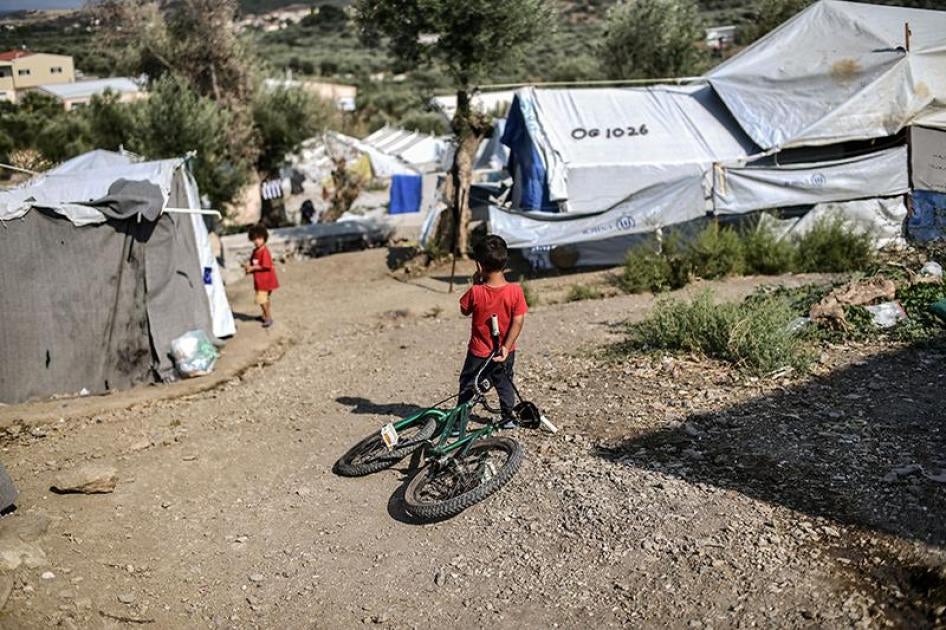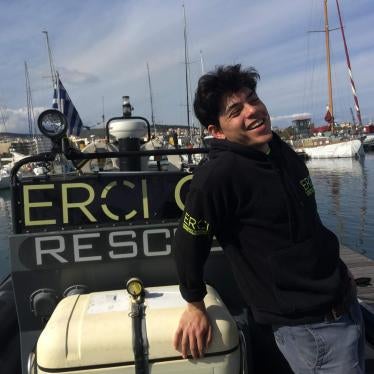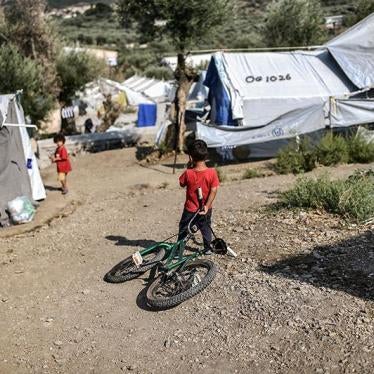(Brussels) – The already dire conditions in the overcrowded Moria camp for asylum seekers on the Greek island of Lesbos may deteriorate into a full-blown humanitarian disaster as winter approaches unless urgent action is taken, Human Rights Watch said today.
“Thousands of people seeking protection in Europe are deprived of their most basic rights to humane and dignified treatment on Lesbos,” said Todor Gardos, Europe researcher at Human Rights Watch. “The EU-backed containment policy is aggravating long-lasting suffering of asylum seekers, turning Lesbos into an open-air prison.”
On a visit to Lesbos from October 16 to 17, 2018, Human Rights Watch witnessed the overcrowding, unsuitable accommodations, and despair in Moria camp and the adjacent overspill camp known as the “Olive Grove.” Human Rights Watch interviewed 26 asylum seekers from Afghanistan, Iraq, Syria, and Somalia, including families and women and men traveling alone.
In September, the Regional Authority of the Northern Aegean, which is responsible for public health, said the Moria camp posed a threat to public health and the environment due to overcrowding, uncontrolled sewage spills, broken toilet waste pipes, and generally poor hygienic conditions that could abet the spread of infectious disease. Conditions in the camp remained unsuitable for accommodation even though the regional authority ordered the migration policy minister and Moria camp’s management in early September to improve conditions within 30 days.
At the time of the visit, over 7,200 asylum seekers were registered in Moria, including 2,000 in the Olive Grove, well over double the camp’s official capacity of 3,100. While numbers had dropped to around 6,500 by early November, according to the UN refugee agency, UNHCR, the camp manager acknowledged that he could not guarantee adequate living standards with such a level of overcrowding.
Under the containment policy enforced since the March 2016 EU-Turkey deal, Greek authorities confine asylum seekers on the Aegean islands, including Lesbos, until their asylum claims are adjudicated, a process that can take months or even years. Vulnerable asylum seekers may be transferred to the mainland, but delays in the vulnerability assessment procedure and the lack of accommodation on the mainland mean thousands of eligible individuals and families remain trapped on the island.
Human Rights Watch has previously documented that many vulnerable groups fall through the cracks in the identification process, and that the lack of prompt transfers put vulnerable people, including people with invisible disabilities and children, at more risk. In a recent report, the Council of Europe’s human rights commissioner expressed concern that the vulnerability assessment procedure is “excessively lengthy and often fails.”
An estimated 18,000 asylum seekers are confined to Greek islands, most of them on Lesbos and Samos; just over 50 percent are women and children. According to the UNHCR, over 4,000 people already identified as “vulnerable” and eligible for transfer are stuck on the islands.
Overcrowding remains a serious problem, with new arrivals outstripping transfers. Between June and October, more than 16,200 refugees and migrants – over one-third of them children – reached Greek islands, mainly Lesbos and Samos. While ad hoc transfers during that period benefited 12,800 asylum seekers, material conditions on Lesbos remain as unsatisfactory as before. In fact, more asylum seekers are in Moria now than in mid-December 2017, when the government, under pressure from a coalition of nongovernmental groups, including Human Rights Watch, announced emergency transfers to avert a humanitarian crisis amid freezing temperatures.
While Greek authorities are directly responsible for the containment policy and the deplorable conditions on the islands, the EU bears collective responsibility for its failure to demonstrate solidarity with Greece and to move asylum seekers out of Greece for processing elsewhere, Human Rights Watch said. EU states failed to relocate two-thirds of their quota under the joint relocation system that was meant to alleviate some of the pressure on Greece between September 2015 and September 2017, failing to provide over 40,000 promised places.
On October 23, the Portuguese government announced that it had entered into a bilateral agreement for a pilot project to transfer 100 refugees from Greece to the country. If successful, Portugal could accept 1,000 people over the next year.
Other EU countries should emulate Portugal’s initiative and offer generous, ad hoc relocation pledges, Human Rights Watch said. Countries that did not fulfil their relocation pledges since 2015 such as Austria, Belgium, France, Germany, and the Netherlands, should show greater leadership in this regard. Contrary to the position of a number of EU governments, speeding up returns would not address the crisis because many of those trapped on the islands could not be sent back to Turkey or their countries of origin under EU law.
Conditions on Lesbos violate EU and Greek laws that require Greece to provide an adequate standard of living for asylum seekers, guaranteeing their subsistence and protecting their physical and mental health. These laws also require that Greece take into account the specific situation of vulnerable people, including pregnant women, unaccompanied minors, people with disabilities, older people, single parents with minor children, victims of torture, rape and sexual violence, and other at-risk people.
Asylum seekers, particularly those with recognized vulnerabilities, should be relocated as a matter of urgency.
The Greek government, with support from the European Commission and EU member states, should end the containment policy on the islands and ensure sufficient and adequate accommodation and services on the mainland. The government should act swiftly to enact a recent pledge to create 6,000 new accommodation places on the mainland that provide an adequate standard of living.
The authorities should urgently improve living conditions on Lesbos and other Aegean islands in preparation for winter to ensure the health and safety of those who remain, including by ensuring adequate and secure shelter, safe drinking water and sanitation, an enabling environment for good hygiene, and protection.
Greek authorities should ensure there is enough separate, secure shelter for all women and girls traveling alone, and separate, safe, secure, physically accessible, and hygienic toilets and bathing facilities that ensure privacy and dignity for men and women. They should provide adequate lighting and identify and monitor high-risk areas.
“EU states should work with their Greek partners to address the persistent humanitarian crisis affecting refugees and migrants in Greece and better share responsibility by providing urgent assistance and relocation,” Gardos said. “The despicable conditions on the islands are a collective shame, and with winter fast approaching time is running out.”
For more details on specific cases, please see below.
Please note, all names of asylum seekers have been changed to protect their privacy.
Long-standing, Avoidable Suffering
The Moria camp is a hotbed of avoidable risks and suffering for asylum seekers. Residents described daily struggles to get safe and adequate accommodation, basic hygiene, food and non-food items, and health care. Asylum seekers, including families with young children, are living in flimsy tents and cramped containers, with an insufficient number of toilets and showers that are also poorly maintained, risking exposure to faecal matter and other health concerns, in a camp with rats and insects.
Moria camp, on a hilly area a 15-minute drive from Mytilini, the main town on Lesbos, is a former military base that the Greek authorities converted in 2016 into an EU-supported “hotspot” to receive, identify, and process asylum seekers and migrants under the rules of the EU-Turkey deal and with the support of EU agencies.
The camp is a jumble of tents and containers. Human Rights Watch visited containers housing as many as 15 people, in which personal space was limited to one square meter. Tents of various sizes housed two to six people. While some containers visited had mats or bunk beds, most people used blankets on the ground as bedding. Dozens of people have to share each toilet and shower – and many of them are faulty, exposing users to faecal and other forms of contamination.
The ‘Olive Grove’
The Olive Grove, a hilly area adjacent to the camp’s perimeter fence has been used as “overspill camp” and housed around 2,000 asylum seekers in tents at the time of the visit. There were only a small number of toilets and showers, inadequate to meet the need or basic humanitarian standards. Some preparatory work to make the area more resistant to weather and enable installation of more bathrooms was ongoing. People living in the Olive Grove had de facto access to the facilities and services in the camp, although all six families interviewed said that security and long waiting times were problems. At night, access to the facilities is restricted, and the Olive Grove has limited lighting.
Most of those interviewed in the Olive Grove, including families with babies, lived in tents and had been there for months. Some of the single men had been there for over six months, one for over eight months.
Gulnoor, an Afghani woman in her thirties who has lived in the Olive Grove living with her husband and two children since the beginning of September said they spent three days sleeping outside after heavy rains destroyed their tent in early October.
Ahmed, in his early twenties from Mosul, Iraq who has a psychosocial disability, has spent four months in Moria camp. He left Iraq after losing all his family there. He showed Human Rights Watch rashes on his arms and legs he said were caused by unhygienic conditions, as well as cuts on his arms he said were caused by the anxiety of living in the extremely crowded container.
He shares a two-meter-by-two-meter space with three unrelated men as a sleeping area, separated from the rest of the container by hanging blankets. A total of 15 men were accommodated in the container at the time of the visit. “I have to wait here until 2019 despite being mentally unwell,” Ahmed said. “I tried to commit suicide. My friends are protecting me from harming myself.”
Hooriyah, an Afghan woman in her twenties, has lived with her husband and their sons, ages 3 and 8, in a crowded container with another family of five since early September. Their asylum interview is scheduled for late November. “How long we can stay we don’t know,” she said. “They say that you have to be vulnerable to be able to move from here. We don’t know what it should mean for a family with small children and basic health issues. When we go to the doctor, they only give painkillers, not proper medicine.”
A group of six unrelated Somali women who live together in an unheated tent in the Olive Grove agreed that the biggest problem was health care, as medical appointments were repeatedly postponed, or only painkillers were given out for treatment. Faduma, who does not know her age but is over 60, said she was sick and felt cold all the time. Human Rights Watch has documented the specific vulnerabilities of older asylum seekers in Greece. The women, considered non-vulnerable single adults, are likely to remain in the Olive Grove for months. “We have no idea how long we will have to stay here,” one said. They said that families get priority although older people are supposed to be treated as a vulnerable group. “We are all single here, so we have to wait,” one of them added.
Gaps in Care
The dire conditions, coupled with lengthy registration, identification, and asylum procedures pose a threat to physical and mental health particularly for already vulnerable asylum seekers. Human Rights Watch and others have documented the devastating impact on the psychological well-being of thousands of women, men, and children trapped on Greek islands. Of the 26 asylum seekers interviewed in October 22 expressed emotional anguish and anxiety over the long wait and the camp conditions. Many said that medical care in the camp was insufficient.
Gaps in access to maternal and pregnancy health care, previously documented by Human Rights Watch, remained. Two nursing mothers, staying in unheated tents in the Olive Grove, with their children, one 6 months old and the other 10 months, said they could not get medication, or hot water, even to bathe their infants. Two others said that pregnant women in their family did not have access to timely pregnancy care.
The camp only has one physician for thousands of people. Interviewees said appointments are set for months ahead and then often postponed. Lack of interpreters also hampers access. A recent UNHCR report echoed concerns that a single doctor employed by the Greek authorities provides medical care to the entire population of the Moria camp. Asylum seekers rely on the limited services of nongovernmental organizations operating inside and outside the camp.
Two of these groups, Doctors Without Borders and the International Rescue Committee, recently reported that overcrowding and unhygienic conditions have caused a surge in the spread of infectious diseases such as diarrhoea and skin infections, and contributed to a mental health crisis affecting children and adults. In July 2017, Human Rights Watch warned against the devastating impact the harsh conditions and uncertainty on the Greek islands have on asylum seekers’ psychological wellbeing.
Nabila, an Afghani mother of three children, ages 10 months, and 3 and 7 years, had been living in a tent in Moria camp for three months. Her children fell sick after the tent flooded in heavy rains in early October. She spoke of boredom, depression, and constant fear: “All days pass standing in line for food, and for other things. We don’t have anything to do in the camp. Personally, I’m very depressed.”
The family’s asylum interview is scheduled for January 2019. The waiting is exacerbated by other fears caused by lack of privacy and safety in the tents and the common areas. “We can’t do anything during this time,” she said. The reason we left was insecurity, and now we feel unsafe here.”
Abed, 21, from Afghanistan, lost an eye to shrapnel and has been unable to get the medication he needs for his artificial eye to avoid infections in the four months since he arrived. “I am supposed to use drops for it, but I have nothing,” he said.
Farzaad and his family of seven – his children, wife and other close relatives – have lived since September in two small tents in the Olive Grove, which they bought for 15 euros. He said that hygiene was their biggest concern: “When we came, the police registered us, and then told to find a place in the “jungle” because there was no space in the camp. I have two children, both of them have dermatological issues. Soon, the showers will be so cold you will not be able to wash yourself. It will be a big problem, especially for the children.”









